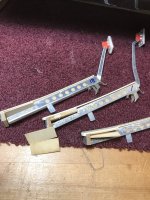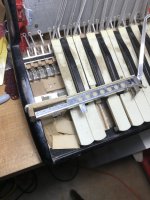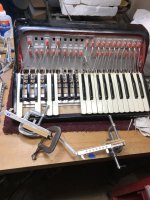… Anyway, this is a mystery as to why this happened with no other water damage. …
From my long experience with wood glue-ups, delaminating might be from one or more causes, for example, a few off the top of my head (in general, not necessarily specific to accordion construction):
- using the wrong glue
- a bad batch of the right glue, or old glue stored improperly, contaminated
- wood prepared improperly (e.g. surface finished too smooth)
- glued with wood not dried properly, perhaps stored improperly at the factory
- wood laminated without consideration of grain direction
- wood contaminated in some way (some type of oil or other finish applied)
- using the wrong wood (some species have higher content of wax or other substance - the bonding surfaces of some species have to be treated with a solvent)
- storage humidity or temperature (too high or too low, rapid changes)
- gluing dissimilar woods (different expansion/contraction moisture/temp coefficients
- too much or two little clamping pressure (leaving too little or too much glue in the joint)
You said “no other water damage”. How is the rest of the accordion, any humidity/temperature storage indications (mildew smell, drying cracks in solid wood, other failed glue joints, etc)?
JKJ



